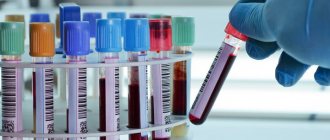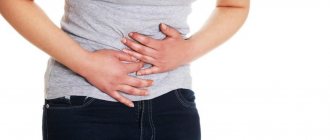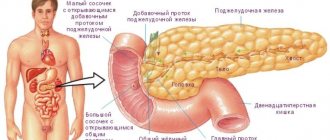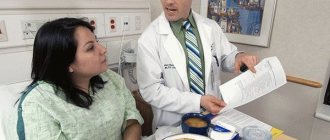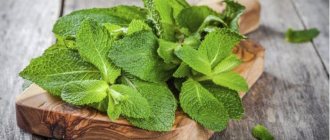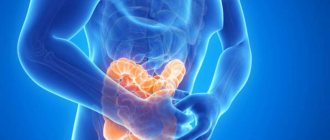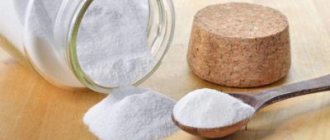Everyone has probably experienced intestinal poisoning at least once in their life. However, it is not possible to diagnose this particular disease immediately, because without special knowledge it is difficult to distinguish it from ordinary food intoxication.
Intestinal poisoning is a group of acute intestinal diseases, similar in symptoms to food poisoning, but caused by viruses and bacteria. They are otherwise called intestinal infections. It is necessary to be able to distinguish intestinal intoxications from food intoxications, to know the causes and main manifestations of infection. This is important for the rapid recovery of a sick person.
Intestinal infections are dangerous because massive outbreaks of infections occur in crowded places (kindergartens, tourist centers, etc.). It is here that, having accidentally received poor-quality food, many people are poisoned at once. Moreover, every sick person becomes infectious to others.
Poisoning pressure
Various symptoms can indicate poisoning, and one of them is surges in blood pressure. Does blood pressure increase or decrease when the body is intoxicated? Doctors cannot give a definite answer to this question, because each human body reacts to poisons that penetrate it in its own way. Some victims note high blood pressure, while others complain of its decrease. One way or another, all doctors strongly recommend monitoring blood pressure numbers after poisoning.
Diet and nutrition for food poisoning
It is advisable to abstain from food on the first day: the functioning of the gastrointestinal tract is disrupted, and the body simply will not receive nutrients from it. But forced hunger is also not necessary, especially if a small child gets sick. The decisive factor should be the presence or absence of appetite in the victim.
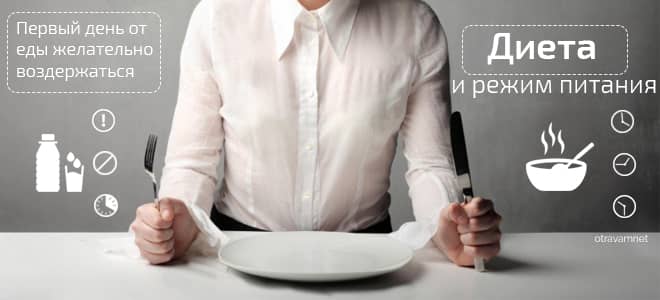
The first meals should consist of small portions 5-6 times a day. Energy value is approximately 2100 kcal. You should adhere to the following diet:
Symptoms
Signs of body intoxication vary depending on the type of poisoning. The main ones are presented in the table:
| Foodborne (caused by bacteria and viruses) | Chemical |
| Increased gas formation in the intestines | Decreased vision clarity |
| Frequent loose stools | Itchy skin |
| Painful sensations in the abdomen | Dry mouth |
| Fever | Frequent vomiting |
| Severe vomiting | High blood pressure |
| High body temperature | Respiratory dysfunction |
| Sweating | Pain in the abdominal area |
| Muscle cramps | Coma |
| Fainting | Nausea |
| Dizziness | Deprivation of correct orientation |
| Painful palpitations | Heart arythmy |
| Increase/decrease in blood pressure | Dizziness |
| Change in urine color | Poor appetite |
| Cough | |
| Headache | |
| Chills | |
| Mucus and blood in the stool | |
| Loose, foamy stool | |
| Constipation | |
| Decreased appetite | |
| Heart rate drop | |
| General weakness |
Return to contents
Increased blood pressure as one of the symptoms of intoxication
Often, when poisoned, patients experience surges in blood pressure. As British scientists have found out, food poisoning affects health and, once poisoned, a person may subsequently encounter pathologies such as hypertension (high blood pressure), kidney dysfunction, arthritis and diabetes. It is believed that any damage to the kidney organ is often provoked by powerful toxic substances produced by pathogenic microorganisms, which are the cause of poisoning. Already a few days after poisoning, high blood pressure can be observed. An increase in blood pressure due to intoxication of the body is often observed in people who have a tendency to hypertension and abnormalities in the blood circulation. That is why doctors strongly recommend monitoring the condition of the kidneys and monitoring blood pressure after poisoning.
Classification
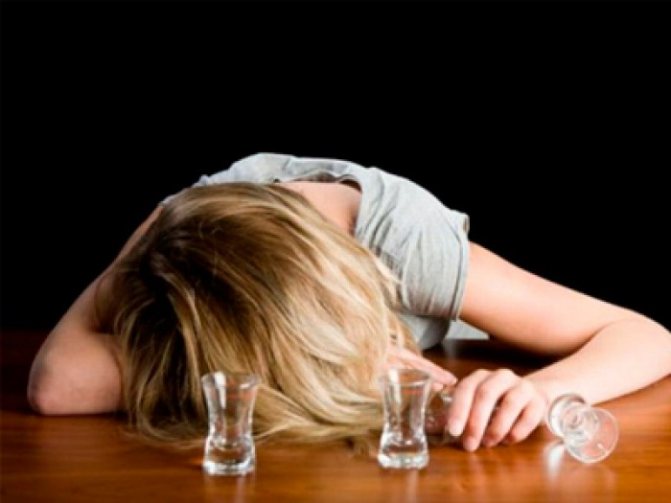
In medical practice, there are two main groups of food poisoning:
- Microbial nature – associated with the contamination of a food product with pathogenic bacteria, their rapid reproduction and release of toxic substances.
- Non-microbial - poisoning by initially poisonous products or poisonous under certain conditions.
In the vast majority of cases, the first type of poisoning occurs, in which the stomach and intestines experience negative effects from toxins of pathogenic microorganisms.
Poisonings that have a non-infectious origin in their etiology are considered the most dangerous, therefore, if they are identified, you should immediately contact a specialist - a toxicologist or infectious disease specialist. Much attention should be paid to the contingent of people who have reduced activity of the body's defense mechanisms. Such victims may include:
- Pregnant women.
- Small children under three years old.
- Children and adolescents entering educational institutions (school or kindergarten) for the first time.
- People of the older age group.
What to do?
If you observe symptoms of poisoning, you should immediately consult a doctor to prevent further growth of the infection and poisoning of nearby organs. The doctor determines the causes of intoxication and if it is food intoxication, then first aid consists of gastric lavage and taking laxatives. To flush out toxic substances from the stomach, you need to take 1.5 liters of a 2% soda solution at a time, and then induce vomiting.
It is strictly contraindicated to provoke the gag reflex during pregnancy, during convulsive muscle contractions, and in unconscious persons. You cannot induce vomiting with soda in people with a weak heart, and also if the poisoning is caused by alkali and hydrocarbon mixtures.
In case of internal acid poisoning, the patient will need to rinse the stomach by drinking 12 liters of plain water before the ambulance arrives. In this case, you should not use baking soda. If a person is poisoned by caustic alkalis, then you need to drink a solution prepared at the rate of 1 g of citric acid per 100 ml of water. For a patient who has inhaled toxic fumes, it is important to provide fresh air and free him from tight clothing that restricts breathing. You will also need to rinse your mouth and throat with a soda solution. If necessary, artificial respiration must be performed, and in extremely severe cases, indirect cardiac massage.
Alcohol and drug intoxication
To cleanse the body of ethyl substances resulting from consuming large amounts of alcohol-containing drinks, the victim is given a gastric lavage using warm water and allowed to sniff an aqueous solution of ammonia. The patient's body is covered with heating pads and plenty of hot drinks are provided. If poisoning is caused by drugs or an overdose of sleeping pills, then it is important not to let the victim fall asleep. The patient is forced to move, given a contrast shower, warmed and rubbed. Any sorbent will help remove toxins and waste from the body.
source
Causes
As already mentioned, the cause of intestinal poisoning is pathogenic microorganisms - bacteria (staphylococcus, Pseudomonas aeruginosa and Escherichia coli, salmonella, etc.) and viruses (noroviruses, enteroviruses, rotavirus, intestinal flu, etc.).
Infection occurs according to a general mechanism - through pathogens entering the body with bad food, drink (water, milk, etc.), and sometimes through household items (through dirt, from a sick person to a healthy person, etc.).
You can get an intestinal infection if:
- personal hygiene rules are not observed;
- products (especially perishable ones) were stored in improper conditions, i.e. outside the refrigerator;
- due to using dirty utensils when preparing food or after touching food with unwashed hands;
- heat treatment of meat was insufficient;
- raw, poorly washed vegetables and fruits were consumed.
Another cause of intestinal poisoning can be cross-contamination when raw foods are placed close to ready-made ones, or the same utensils were used for cooking meat and cutting vegetables for salad.
The main causative agents of intestinal poisoning are:
- Escherichia coli. It is already present in the human body, but in a safe amount. Most groups (strains) of E. coli are not dangerous, but some can cause acute intoxication. You can become infected after eating half-raw meat or raw milk.
- Listeria. It most often “lives” in prepared food products (pates, stale sandwiches, butter) or in raw meat and fish. To avoid catching it, you need to carefully look at the expiration dates.
- Campylobacter, salmonella. Poorly fried liver (especially chicken), raw milk, meat, water that has not undergone high-quality purification - all this can contain these pathogens and cause infection.
- Viruses (rotavirus, norovirus, etc.). They can be found in untreated water, crustacean dishes and many other foods. Infection occurs through food and is transmitted by contact.
Separately, it is necessary to say about parasites. They also enter the body with water and food. Food becomes contagious if insects that carry diseases (cockroaches, flies, etc.) have crawled on it. Parasites take root inside the intestines, which causes inflammation of the mucous membranes and the formation of ulcers. Also, pathogens can be transported through the blood through the human body and settle in the liver, lungs, and organs of the cardiovascular system, affecting them.
Types of intoxication
There are two types of poisoning: external and internal. Internal ones are a consequence of the work of the body itself, while external ones cause intoxication due to substances coming from outside.
Causes of external intoxications:
- Toxic chemical elements - heavy metals, gases, acids, alkalis, pesticides.
- Biological substances are poisons contained in plants and secreted by animals.
- Alcohol and medications.
- Poor quality products - expired, improperly prepared, containing toxic substances.
- Bacterial infections - staphylococcus, salmonella, E. coli, listeriosis.
Causes of internal poisoning:
- Inflammatory processes in the body.
- Metabolic disorder.
- Excessive production of certain compounds by the body - hormones, ketone bodies, adrenaline, phenol, ammonia.
Principles of treating food poisoning
If symptoms of food poisoning appear, you need to identify the cause of their occurrence. Any diagnosis involves collecting information about the patient - a list of foods or drinks consumed, their quantity, as well as the presence of specific diseases that may affect the patient’s condition.
It is necessary to determine which product caused the food poisoning and eliminate it from the diet. It is advisable not to throw away
source of toxins in food poisoning, and keep it separately - it may be needed in the future for laboratory analysis. Poisons contained in low-quality food have different rates of impact on the body, so you should take into account all the foods eaten over the past two days.
To do this, you need to rinse the victim’s stomach. Natural vomiting may not be enough, so you should drink about two liters of salted water. If a significant amount of time has passed since eating, some of the toxins have already reached the intestines, where they are absorbed into the blood. To prevent this, the patient needs to take sorbent drugs.
The most famous of them is activated carbon. For food poisoning, take 1 tablet of activated carbon per 10 kg of body weight. To achieve the fastest effect, the drug must be crushed, mixed with 100 ml of water and drunk.
To alleviate the condition of the victim and relieve headaches, you can apply a cool compress with salt water to the forehead. It is not recommended to take painkillers - they will blur the symptoms of food poisoning and complicate diagnosis. The procedure should be performed until the vomit is cleared of food debris.
The most common side effect of food poisoning is stool upset. This happens because harmful substances irritate the mucous membrane of the intestinal walls, causing inflammation and the release of serous fluid. Due to swelling, the tissues lose their ability to absorb incoming water and electrolytes, and diarrhea occurs.
To replenish fluid loss, it is necessary to ensure that a person suffering from food poisoning drinks plenty of fluids. It is advisable after each subsequent attack of vomiting or bowel movement to drink 200 ml of boiled or mineral water without gas, glucose-saline solution (1 teaspoon of salt, 3 tablespoons of sugar per liter of water). You need to drink in small sips so as not to cause vomiting. In total, you should drink at least 2–3 liters per day (for an adult).
Diarrhea due to food poisoning is a method of self-defense of the body. In its absence, the intestines should be cleansed on their own, especially if a large number of poisoned foods have been taken - sorbents may not be able to cope with them. The procedure is carried out two hours after taking activated carbon or its analogues. Use an enema with salted water (1 tablespoon of salt per liter of water) or a weak solution of potassium permanganate (a couple of crystals until a pale pink tint is obtained). Colon cleansing in this way is prohibited in the following cases:
- mechanical or paralytic intestinal obstruction;
- significant gastrointestinal bleeding;
- uncontrollable vomiting;
- impossibility of tracheal intubation.
Due to the action of poisons, intestinal function is almost always disrupted. To restore the microflora and help the body fight the consequences of food poisoning, you need to take probiotics - medicinal drugs that are sold in any pharmacy without a prescription. They contain beneficial bacteria or their components, and accelerate the
recovery. The appointment lasts 1–2 weeks. Weakness, flatulence and minor stomach pain may continue for a couple of days - this is normal.
The patient needs bed rest on the first day of food poisoning, and gentle rest during recovery from food poisoning. Isolate him from the rest of the family and wipe his hands with disinfectant at home, as similar symptoms are observed with bacterial infections. Call a doctor. It is undesirable to place the victim on his back, as he may choke on vomit. A more comfortable rest option is lying on your side.
Symptoms
Different types of poisoning differ in their characteristic features.
Food intoxication
- Disorder (diarrhea).
- Weakness.
- Aches, muscle pain.
- Fever.
Low-quality alcohol, surrogates
Severe intoxication should be distinguished from poisoning with low-quality alcohol and its surrogates. Signs of alcohol intoxication:
- Loss of vision.
- Delirium, hallucinations.
- Cramps.
- State of stupor.
- Pulmonary edema.
- Loss of orientation.
- Numbness of arms, legs.
- Headache.
- Cold, sticky sweat.
- Change in skin color.
- Reduced temperature.
Toxic substances
Carbon monoxide poisoning occurs in fires and may be accompanied by:
- Headache.
- Asphyxiation.
- Loss of consciousness.
Heavy metal poisoning is a prolonged process associated with the gradual accumulation of metals in the body. The reason lies in living in polluted places, in industries, due to air pollution. Upon contact with various metals (for example, if a thermometer is damaged), a person can develop an acute form of poisoning.
- Nausea, vomiting, abdominal pain.
- Temperature increase.
- Digestive disorder.
Measures before the doctor arrives
Some species cannot be dealt with on your own. In case of intoxication with heavy metals, industrial poisons, gases, plant and animal poisons, medications, low-quality alcohol, or severe food poisoning, you must call an ambulance, but during the waiting period you will need to provide the patient with all possible assistance.
- Give the patient a warm saline solution, sorbents, and laxative to drink.
- In case of loss of consciousness, place the patient upside down, raising his legs up.
- If the heart and breathing stop, perform artificial respiration.
- In case of bites from poisonous snakes and insects, remove the poison from the wound by squeezing and localize the bite site.
- For bee and wasp stings, apply a cool compress.
- For food poisoning, take a laxative and empty your stomach.
- Rinse the stomach by artificially inducing vomiting with a solution of baking soda.
- Cleanse the intestines with an enema. You can use clean water at a temperature of 36-38 degrees. It is important to avoid the use of cold water, which can cause intestinal spasms, and hot water, which burns the mucous membrane.
- Take sorbents - Enterosgel, Regidron, activated carbon (one tablet per 10 kilograms of weight).
Heavy metals
In acute forms of heavy metal intoxication:
- Stop contact with the toxic substance and leave the premises.
- Rinse mucous membranes - mouth, eyes.
- If it enters the gastrointestinal tract, rinse the stomach and induce vomiting.
- Cleanse the intestines with an enema, castor oil, laxative.
Poor quality alcohol
Alcohol substitutes are deadly, if you suspect you should call an ambulance immediately! If the patient is conscious:
- Induce vomiting, drink clean water, soda solution.
- Rinse the intestines with an enema, laxative, oil.
- Saturate the body with oxygen.
- Place the victim on his side to prevent choking on vomit.
- Remove the patient from the smoky room.
- Take the patient to fresh air.
- Warm up.
Sorbents
| Name | Description | Contraindications | Cost, rub |
| Activated carbon | It is used for food intoxication, diarrhea, dysentery, salmonellosis, and allergic diseases. | Contraindicated for ulcerative lesions of the gastrointestinal tract. | From 20 |
| Smecta | It is a natural sorbent. It is used for diarrhea, intoxication, nausea, heartburn, bloating and gas formation. | Not recommended for people with fructose intolerance. | From 149 |
| Sorbolong | The drug is prescribed to detoxify the body. Effective for kidney diseases. | Not recommended for patients with acute intestinal obstruction. | From 56 |
| Polysorb | Sold in powder form for suspension. Taken for acute and chronic intoxication. | The drug is contraindicated in patients with gastrointestinal bleeding. | From 107 |
| Chitosan | Able to stop bleeding, regulate the condition of lymphatic cells, and cleanse the intestines of toxins. | The drug is not recommended for children under 12 years of age. | From 860 |
Change in blood pressure
An increase or decrease in blood pressure is a symptom of intoxication of the body.
High blood pressure is a typical symptom of mercury poisoning. In other cases, high or low blood pressure is observed; each person’s body reacts individually.
Low blood pressure during poisoning indicates problems with the pancreas. Blood pressure may rise if the liver or kidneys are not functioning properly. When intoxicated, the liver is the first to take the hit, blood pressure and temperature rise.
High blood pressure is dangerous for the body, the heart and blood vessels suffer, and a stroke is possible.
If your blood pressure rises or falls during intoxication, you can take infusions of herbs - artichoke, knotweed, milk thistle, plantain, immortelle, thyme, chamomile. Herbal infusions have a mild, gentle effect. Medicines that help include asparkam, panangin, triampur, and diuver. For high blood pressure, diuretics work to lower blood pressure.
In the following cases, calling an ambulance is necessary:
- An increase in temperature, the return of high readings after it was knocked down.
- Blood pressure 70/50 or 140/90.
After intoxication, high/low blood pressure persists for several days; the indicators must be monitored; if they do not return to normal, seek medical help.
Recovery
After poisoning, the body is weakened. You are supposed to follow a light diet for a week - give up fatty, fried, heavy foods, eat a lot of vegetables, fruits, and cereals. It is worth drinking more liquid - mineral water, green tea, herbal decoctions. Alcoholic drinks and sweet carbonated drinks are prohibited.
The consequences of exposure to heavy metals on the body are critical, therefore, in addition to a special diet, a rehabilitation course and taking medications prescribed by the doctor are necessary. A sauna or steam bath is recommended, removing toxic substances through the pores.
It is worth remembering that intoxication is a dangerous condition that a person cannot cope with on his own. Even ordinary food poisoning can have serious consequences, so you need to turn to professionals.
source
Home treatments
Very often, the consequences of food poisoning have to be treated at home, and doctors say that if all procedures are followed, the solution is the most correct. In the case when the body is exposed to toxins, the time factor is one of the most important in relation to the future development of the disease: the sooner the treatment of poisoning begins, the less the threat to the patient’s health in terms of complications.
Treatment of poisoning at home involves the use of folk remedies and medications, which, in combination with other procedures, help rid the body of toxic effects, prevent dehydration and eliminate the symptoms of the disease.
Gastric lavage
Almost every adult is familiar with the term cleansing the stomach by lavage, but not everyone knows how to carry out the procedure and what solutions to use. The most common method of preparing a solution among people is potassium permanganate, where the antiseptic substance is calcium permanganate, a crystalline substance that is dissolved in water until a pale pink color appears. A special feature of the preparation is the complete solubility of the crystals in the liquid (it is advisable to strain the solution additionally), after which the maximum amount of the solution is drunk, which in itself should provoke the urge to vomit. Too strong a concentration of the substance in the liquid can lead to negative consequences in the form of burns to the walls of the gastrointestinal tract.
If there is no potassium permanganate in your home medicine cabinet, you can replace the substance with baking soda (0.5 tbsp per 3 liters of water), or table salt (0.5 tbsp per 3 liters of water). The washing procedure is carried out in the same way as in the case of a manganese solution. If during the process of gastric lavage there are food particles in the vomit along with the liquid, it is advisable to repeat the procedure.
Purgation
The list of symptoms of poisoning often includes diarrhea, so the body tries to independently organize the removal of toxic substances. At the initial stage, this should not be prevented in any way by taking special medications, but rather organize intestinal lavage by using an enema, which helps flush out harmful microorganisms. In this way, toxins and food particles that provoke their formation are removed from the intestines. The procedure for cleansing the intestines in children is performed using a syringe bulb; for adults, a special heating pad with a rubber outlet is used.
Starvation
Dieting and fasting are another method that is used in the treatment of food poisoning. Since the consequences of poisoning weaken the human body, fasting for one or two days is, in fact, not at all difficult, since the patient, as a rule, has practically no appetite for some time. There is no need to fast for a long time: the gastrointestinal tract and digestive organs require 1-1.5 days to completely remove toxins, after which the patient is prescribed a special diet.
What can cause poisoning?
It doesn’t matter what provoked the intoxication of the body, the harm is caused not only to the gastrointestinal tract, but also to other organs. Depending on the source of toxins, the following types of poisoning are distinguished:
- Food. Caused by the influence of toxic substances that entered the body with food.
- Medicinal. Deliberate or accidental overdose of medications causes disruption of the body and the accumulation of a significant amount of toxins from the breakdown of medications.
- Chemical. The source of this condition is the release of harmful chemicals into the air. Through the respiratory tract, toxic elements enter the bloodstream and cause severe intoxication.
- Alcohol or drugs. Excessive consumption of alcohol or drugs causes the accumulation of toxins in the body, which lead to poisoning and severely weakened immunity.
Washing
Treatment of intoxication after food poisoning includes gastric lavage. Otherwise, pathogenic bacteria and toxic elements that penetrate the digestive tract spread throughout the body, being absorbed into the blood. They can cause side effects including respiratory arrest, cardiac arrest, and even death. Therefore, effective and necessary treatment after intoxication is gastric lavage.
To get rid of toxins, prepare several liters of solution. Depending on the severity of intoxication, 5 to 10 liters may be required. It is allowed to use chilled boiled water for the procedure. Soda is added to it. One tablespoon is enough for two liters of water.
It is also allowed to use a weakly concentrated solution of potassium permanganate.
- Rinsing must be done in a reclining or horizontal position. The patient lies on his side so that the head is below the level of the body. This position will not allow vomit to enter the respiratory tract;
- A container is placed on the floor to collect vomit;
- Skin protection measures are taken. To do this, you can wear rubber gloves or an apron;
- The initial amount of solution taken should not exceed 0.5 l;
- After taking the solution, the patient should bend over the container and press on the root of the tongue;
- The procedure should be carried out until the washing solution becomes clean;
Causes of blood pressure surges during poisoning
An increase in blood pressure during intoxication may be due to the reaction of internal organs to toxic substances that have entered the body. The following reasons for changes in the indicator are identified:
Other symptoms
High blood pressure is not the only symptom of internal organ damage from toxins. Poor circulation and other disorders in the body lead to the following symptoms:
- dizziness;
- migraine;
- nausea and vomiting;
- increased body temperature;
- weakness;
- irritability.
Return to contents
Treatment of poisoning with folk remedies
Some patients believe that first aid will solve the problem of poisoning. Of course, acute symptoms will go away, but harmful substances are still in the body and negatively affect metabolic processes. To finally deal with the disease, additional efforts will be required, and for this it is not at all necessary to take medications: traditional treatment for food poisoning offers a lot of simple recipes.
However, the patient will have to think carefully and find out the cause of the disease, because in each case different remedies are used.
Doctors distinguish 2 types of fish poisoning: cholera-like and paralytic. If in the first case the symptoms are of a general nature, then in the second there is an effect on the nervous system up to paralysis and convulsions.
This form of the disease should be dealt with in this way:
- Rinse the stomach and induce vomiting.
- Brew chamomile (1 tsp per 1 tbsp boiling water), cool and give an enema.
- Drink hot liquid in large quantities (tea, coffee, and even warmed wine is allowed).
- Dilute 1 tbsp. anise vodka in a glass of water and drink in one gulp.
- Warm your stomach first, and then your whole body (climb under a warm blanket with clothes on).
And although it is difficult to make other meat products (for example, lard) marketable in this way, numerous freezing and violations of storage conditions contribute to the development of pathogenic bacteria in the product.
Usually the smell warns of the poor condition of meat, lard and sausage, but special chemical sprayers deceive the buyer's receptors. Having tasted a couple of pieces of the missing food, after 1-2 hours a person begins to experience pain in the stomach, dizziness, nausea and vomiting.
Sometimes patients complain of difficulty breathing and cardiac dysfunction, but such symptoms are not observed often. Gastric lavage with soda solution and artificially induced vomiting are the first measures, and additionally, folk remedies for food poisoning recommend warming the abdomen and the whole body, using castor oil and herbal decoctions.
Chicory

If the roots of this plant are used as an additive to coffee, then the aerial part is used for poisoning:
- Grind the flowers and chicory herb, but do not mix them right away;
- 4 tbsp. each part is poured into a thermos;
- Pour 1 liter of boiling water;
- Leave for 7-8 hours;
- Drink 2-3 sips every hour for 1 day.
Wormwood and yarrow
For any disorder of the gastrointestinal tract, healers recommend bitter wormwood collected in May. Although the taste of the broth may even seem disgusting to some, the result is worth the effort.
- Wormwood and yarrow are dried and crushed.
- 1 tsp. raw materials are poured into a 0.5 jar.
- Pour boiling water over and cover with a lid.
- Leave for 1 hour.
- Strain and drink 5 times during the day.
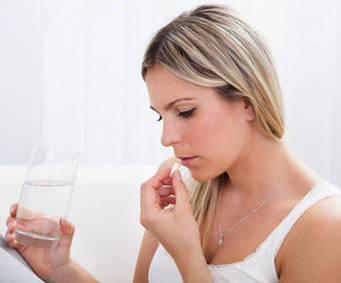
Every person has known about edible and inedible mushrooms since childhood, but people often make mistakes when collecting them! A similar mistake cost the lives of many mushroom pickers, and doctors call this type of poisoning the most dangerous. What should you do if symptoms of toxicosis suddenly appear after eating a treat?
- Be sure to induce vomiting.
- Take a laxative if you don't have diarrhea.
Make a chamomile enema:
- 1 tbsp. herbs and flowers pour 1 tbsp. boiling water (cook according to the volume of the enema, but in a given proportion);
- leave for 1 hour;
- strain and fill the enema;
- perform the procedure once, and if necessary, twice.
- Rub the body and place a heating pad on the stomach.
What to do?
In case of severe pressure surges, which are accompanied by a deterioration in the patient’s condition, it is not recommended to self-medicate, but to seek help from a doctor as soon as possible, since severe intoxication with increased pressure can cause a stroke, which leads to disability.
Before starting treatment procedures, it is necessary to determine the cause of poisoning; if various factors are influenced, other therapeutic measures are carried out. In case of intoxication caused by taking toxic products, the use of medications is not recommended, since such actions only aggravate the patient's condition. In this case, folk remedies will help, such as herbal infusions, cabbage or tops decoctions.
Features of alcohol and drug intoxication
If poisoning occurs due to alcohol or drug abuse, it is necessary to rinse the patient's stomach. To do this, it is necessary to force the patient to drink a large amount of water and induce a gag reflex by pressing on the base of the tongue. If you lose consciousness, ammonia will help, and if breathing and circulation stop, it is recommended to perform artificial ventilation and cardiac massage. Similar actions can be carried out after calling an ambulance. Such a patient should not be left unattended, as uncontrolled vomit can enter the respiratory tract and lead to respiratory arrest.
source
When is it necessary to see a doctor?
Nausea is a sign that the body is experiencing serious problems at this moment and needs to be cleansed. Such patients need properly selected treatment. It is not recommended to consult a specialist if the attack of nausea was a one-time occurrence. This manifestation in most cases is caused by motion sickness, nervous breakdown, or overeating. Also, a feeling of nausea can occur with alcohol poisoning. Treatment in this case is not necessary.
But with increased intoxication, repeated repetition of gag reflexes, the formation of chronic diseases or the presence of diabetes mellitus, or if the patient experiences dizziness, contacting a doctor should be mandatory.
Emergency help is required if:
- Nausea accompanied by acute pain in the lower abdomen;
- Presence of blood;
- Manifestation of dehydration, dry mouth;
- Frequent urination;
- Deterioration in functional or mental activity;
- If the patient experiences dizziness;
- An ambulance must be called for children under three years of age and elderly patients over 65 years of age;
Why does blood pressure increase or decrease during poisoning?
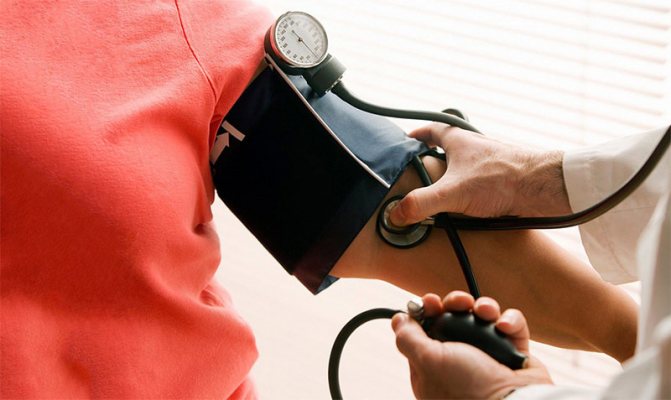
Whatever the cause of intoxication, it affects the entire body as a whole. That is, not only the stomach suffers, but also other organs. For example, the liver always enlarges, this is due to stagnation in the blood flow inside the organ, during which an accumulation of hemoglobin is formed, but its production practically stops, and, as a result, the pressure increases.
What to do if the pressure changes?
The first thing to do in case of pressure surges after poisoning is to determine what caused this symptom, since the effectiveness of taking any drugs depends precisely on what was the source of the change in pressure and, as a consequence, headaches and attacks of nausea.
If the cause of the jump is the influence of toxins on the kidneys, stagnation in them, or some other disturbance, for example, excessive stress from internal muscle spasms or from taking medications, then the pressure will rise sharply.
If the pressure drops, then the cause of this in case of poisoning is dysfunction or the onset of inflammation in the pancreas. Only her disorders reduce her blood pressure and cause loss of strength.
With a strong influence of toxic substances that enter the body, not only pressure but also temperature increases on the liver. Dysfunctions or other pathological processes in the kidneys and pancreas caused by poisoning occur without intense heat, and the temperature does not rise above 37.7.
If the liver cannot cope with the consequences of poisoning, the temperature very quickly rises above 38 and in general the person’s condition is similar to the symptoms of the onset of the flu.
It is impossible to completely ignore a symptom such as low or high blood pressure, because in addition to feeling unwell, when this indicator changes, there is a disruption in the supply of oxygen to brain cells, which causes headaches. In addition to migraines, nausea or weakness, this condition is dangerous because the lack of oxygen causes the death of individual cells and can provoke a stroke or some kind of nervous disorder.
Dangerous manifestation of artificial vomiting
When the first symptoms appear, the patient must receive medical attention. But it is strictly prohibited to provoke unnatural vomiting if:
- The patient is unconscious;
- If a person suffers from diseases of the cardiovascular system;
- If a person has seizures;
Artificial vomiting should not be provoked in pregnant and lactating girls, children under four years of age, and elderly people over 65 years of age.
Nausea is not considered a disease. It indicates any malfunctions in the body, or the entry of poor-quality food into the stomach. Attacks of nausea are caused by irritation of receptors in the gastrointestinal tract, which can send a signal to the brain.
In case of severe intoxication, treatment should be carried out under the supervision of a professional specialist.
How to treat?
In addition to whether blood pressure can rise during poisoning, the question of how much it can rise or fall is also important. If the surge is very strong, you should immediately call an ambulance without taking any medications until the doctors arrive. If the situation is not critical, then it is quite possible to cope on your own, taking into account which of the organs caused the deterioration in well-being.
| What causes a blood pressure disorder? | What medications are recommended | |||||||
| Pancreas | "Asparkam" "Diuver" | |||||||
| Liver | "Magnesia" or - magnesium sulfate With regard to medications, great caution should be exercised, since all drugs have side effects, and the human body, weakened by intoxication, is much more susceptible to them than in its normal state. Potential negative effects can be reduced by using a medicine such as Plantaglucid. But this drug, made from plantain extract, while protecting the stomach, will at the same time reduce the effectiveness of blood pressure regulation by medications. This is why medications cannot always be used in the presence of consequences of food poisoning, even if no symptoms have been observed for several hours. It is especially undesirable to resort to the help of pharmaceutical products in case of very severe intoxication, with acute symptoms. In this situation, when the poisoning itself was severe, folk remedies can help reduce or, conversely, increase blood pressure. Among medicinal recipes, of course, a special place is occupied by infusions, teas and decoctions of herbs and vegetables, but taking them in order to raise low blood pressure in case of poisoning or reduce high blood pressure is necessary, like medications, taking into account which of the organs cannot cope with consequences of intoxication.
|
Emergency care and treatment
Many people do not know what to do if they are poisoned.
It is very important to recognize poisoning in time and provide first aid to the victim. The first step is to eliminate the intoxication factor. What can be used as first aid? To do this, it is necessary to rinse the stomach with plenty of warm water. You can drink water in unlimited quantities. You can also drink tea with sugar and crackers if you are poisoned. If you have potassium permanganate or baking soda on hand, you can make a low concentration rinsing solution. To prepare a solution with potassium permanganate, you need to add several crystals of potassium permanganate to 2-3 liters of water until a weak pink solution appears.
Important! This solution must be drunk very carefully. Be sure to make sure that all the crystals have dissolved to avoid burning the stomach lining!
To prepare a saline solution, add a tablespoon of soda and two teaspoons of salt to the same volume of warm water, then stir vigorously and drink.
It is necessary to drink the entire prepared volume of the solution within 10-15 minutes, after which you need to induce the feeling of vomiting to cleanse the stomach. Thus, the stomach will also be cleansed of toxins and pathogenic microorganisms.
Can the stomach not hurt when poisoned? Pain in such situations is the first sign of toxic infection; it is the first warning factor. However, with some diseases, for example, with botulism, general intoxication of the body comes to the fore, so the patient may not complain about a sore stomach.
When should you call doctors?
Calling an ambulance if you feel unwell can never be unnecessary or inappropriate, and even more so in case of food intoxication with accompanying complications in the form of changes in pressure and temperature. However, most people prefer to treat themselves, which is quite justified for minor ailments.
Nevertheless, there are a number of factors when it is simply necessary to call a team of doctors; this must be done if:
- The temperature rose several times to 39, several times when, after taking measures, the fever returned quite quickly within three hours.
- The pressure level is lower than 70/50, this requires immediate seeking professional help, since at 50/35 a coma occurs.
- A high level of pressure that has crossed the mark of 140/90, this condition is dangerous due to the threat of vascular rupture and stroke.
That is why, if there are significant changes in its levels, with a very rapid increase or decrease, you should not self-medicate, but urgently call a doctor. Delay in this situation can lead to very serious consequences, including disability and even death.
source
Tell us about us!
Add a comment Cancel reply
- Copyright holders
- Privacy Policy
Treatment of diseases online © 2020 All rights reserved © 2020. Attention! The information published on the site is for informational purposes only and does not constitute a recommendation for use. Be sure to consult with your doctor! The Materials may contain information intended for users over 18 years of age. 18+
Medicines and antibiotics for food poisoning
All medications for food poisoning should be taken strictly according to the instructions. Make sure that the products have a valid expiration date, are appropriate for the patient’s age, and that there are no reasons for their contraindications.
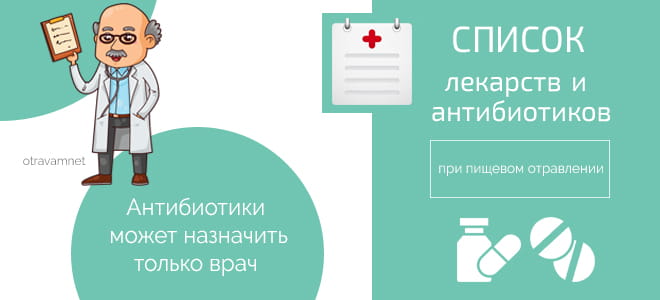
Treatment of food poisoning at home allows the use of the following medications:
- Sorbents bind toxins and remove them from the body. The dose should be taken no earlier than two hours after taking other medications. They are used with caution if an elderly person or a child under 3 years of age is sick. Not recommended at high temperatures. At home, the use of white coal, Enterosgel, Polysorb, Lactofiltrum, Smecta is allowed.
- Rehydration products - replenish the deficiency of moisture and electrolytes. In everyday life, oral rehydrants are used, which are diluted with water and taken in the form of solutions. The use of Regidron, Litrozol, Chlorazol, Oralit is allowed. In the hospital, in case of severe intoxication, intravenous infusions of stronger rehydrants are performed - Lactosol, Trisol, Acesoli.
- Antispasmodics are allowed only as prescribed by a doctor. They help get rid of painful urge to defecate and significant pain symptoms. The main drugs are No-shpa, Spazmalgon, Drotaverine, Spasgan.
- Antiemetics - allowed only for persistent vomiting. Use Motilium or Cerucal.
- Antidiarrheal drugs are also used in exceptional cases. These include Trimebutin, Loperamide.
- Antipyretics (at temperatures above 37.5) - paracetamol, Ibuprofen, Ibuklin.
- Preparations for restoring intestinal microflora - Mezim, Linex, Hilak forte, Bifidumbacterin.
- To support the liver, which is actively involved in eliminating toxins, you can take hepatoprotectors - Heptral, Essentiale Forte N.
- It wouldn’t hurt to strengthen the body by adding vitamin-mineral complexes (Alphabet, Vitrum and analogues): they speed up metabolic processes and promote rapid recovery. They should be taken no earlier than 3–4 days.
Antibiotics for food poisoning can only be prescribed by a doctor, provided that the poisoning was caused by microbes (for example, staphylococci). Otherwise, they have an unnecessary inhibitory effect on the intestinal microflora. Folk remedies for food poisoning are not recommended.
